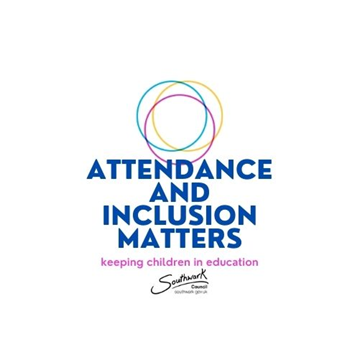Introduction
Regular and punctual attendance at school or alternative education provision is both a legal requirement and essential for pupils to maximise their educational achievement. Southwark Council is committed to reducing persistent absence and school exclusion from school by providing a wide range of support and intervention so that children benefit fully from the education provided to them.
The Department for Education Guidance states:
‘Working Together to Improve School Attendance’ (2022) requires local authorities to ‘Circulate clear guidance on how schools, the School Attendance Support Team (in Southwark this is the Education Inclusion Team) and other partners should work together to provide intensive voluntary and/or formal support for individual pupils and families.’

The purpose of this handbook is to ensure that schools and lead professionals in key local authority agencies are able to access education inclusion guidance, procedures and best practice easily, and effectively discharge their responsibilities in keeping children and young people in education. We also aim to deliver a clear, consistent and fair approach to the implementation of parental responsibility measures across the range of educational settings and local authority services in Southwark. For this purpose, we are introducing a new three-stage approach to attendance and inclusion, to provide a clear process map and checklist for schools and lead professionals to follow. A simple to follow visual is provided in appendices 1-3 (PDF, 201kb), with a more detailed explanation for the three stages set out in the sections below.
It's crucial that all families are able to access appropriate help and support at the right time order to prevent the need for statutory attendance action or school exclusion. In Southwark, all services providing support to families - whether universal, targeted or statutory - have a duty to ensure that families receive help as soon as attendance or behavioural problems emerge, and receive the support needed to create and sustain positive change.
Our aim is always to seek alternatives to enforcement or exclusion action. However, we recognise that in some cases parents and young people will not be able to engage with this support and will struggle to meet minimum expectations. In these circumstances, schools and lead professionals must be aware of their responsibilities and feel supported to deploy the full range of statutory and non-statutory responses needed to increase school attendance and promote inclusion.
Parents are ultimately responsible for ensuring that children of compulsory school age receive a suitable full-time education. This can be by regular attendance at school, an alternative provision, or otherwise (for example, the parent can choose to educate their child at home).
A child reaches compulsory school age on or after their fifth birthday. The following applies:
- if they turn five between 1 January and 31 March, they're of compulsory school age on 31 March
- if they turn five between 1 April and 31 August, they're of compulsory school age on 31 August
- if they turn five between 1 September and 31 December, they're of compulsory school age on 31 December
A child continues to be of compulsory school age until the last Friday of June in the school year when they reach sixteen.
Local authorities and schools have legal powers to use parenting contracts, parenting orders and penalty notices to address poor attendance and behaviour in school. Schools are required by law to have a written behaviour policy (Behaviour in schools guidance -publishing.service.gov.uk - September 2022).
Schools should keep parents and carers informed about the use of parenting contracts, parenting orders and penalty notices in their behaviour policy. Local authorities also have other powers to enforce school attendance where this becomes problematic, including the power to prosecute parents who fail to comply with a school attendance order, or fail to ensure their child’s regular attendance at school. Local authorities and schools using parenting contracts, parenting orders or penalty notices need to ensure that parents affected have access to clear, accurate information, including guidance on their rights and responsibilities.
For the purpose of this guidance, a parent means:
- All natural parents, whether they're married or not
- Any person who has parental responsibility for a child or young person; and
- Any person who has care of a child or young person (for example, lives with and looks after the child)
Ultimately, the local authority and school decide who falls within the definition of a parent with respect to a particular pupil when using legal measures, but generally ‘parents’ are those individuals with day to day responsibility for the care of a child.
Although initial responsibility for addressing attendance concerns with parents and young people will rest with schools, schools will rely on other statutory agencies working with a young person and family to ensure that attendance and inclusion issues are addressed in all local authority child and family plans, and be conscious that attendance and inclusion concerns are not the sole responsibility of schools or specialist education workers.
Page last updated: 16 January 2023
